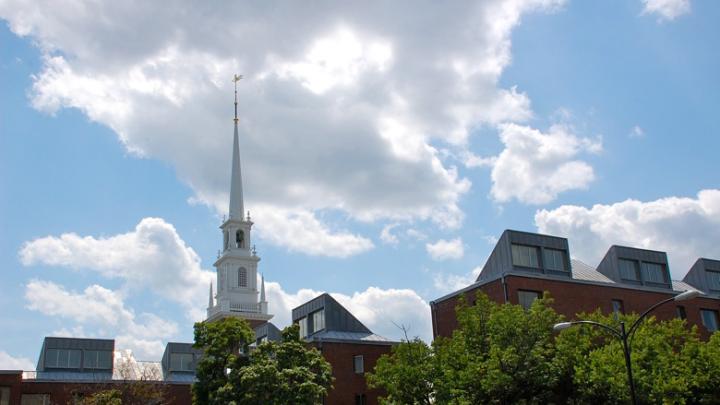The Crimson Summer Academy (CSA), a Harvard program begun in 2004, assists low-income, high-achieving Boston and Cambridge students in becoming successful college applicants. Graduates of CSA are publicly recognized by the University each year during the afternoon exercises on Commencement day. This summer, Melanie Long '10, one of Harvard Magazine’s incoming Berta Greenwald Ledecky Undergraduate Fellows, is a mentor for CSA, and filed this report.
A few weeks ago as I dragged my suitcases across the Yard's uneven paths on my way to Canaday, I began to think about the first time I made that journey, in the fall of 2006. It was move-in day freshman year. I was wondering what my dorm would look like, nervous after hearing reports that it was viewed as one of the less desirable places to live. Canaday, a.k.a. The Projects (as I learned from My First Year, the edition of the Harvard Crimson that is delivered to all rising freshmen before the beginning of school), was built in the 1970s after the 1969 student takeover of University Hall. Not just its vertical entryways, but also its hallways, require a key to enter: this makes it challenging to interact with those who live around you. But my image of Canaday as a mediocre dorm I tried to make the best of freshman year has changed this summer. Now it has become a place where I have seen a community grow and support its members. This transformation springs from my experiences living there as a mentor for the Crimson Summer Academy (CSA).
To win one of the 30 spots in each annual CSA class, ninth-graders must be nominated by their high schools and then go through an intensive application process. Once admitted, they commit to returning for the next three summers. For the first two summers, they take a wide range of courses, ranging from quantitative reasoning to debate, taught by local high-school teachers. In their third summer, they take courses offered through Harvard Summer School. CSA seeks to provide the support and guidance necessary for the students (referred to as CSA scholars) to successfully apply to and graduate from four-year colleges and universities. This support network is achieved through a team of faculty and staff members and Harvard undergraduate mentors.
In past summers, CSA used Weld and Matthews to house the scholars and mentors. Finally, I thought, I would hear laughter coming from the room next door and be able to stop by to join the fun without having to go outside into a different entryway. My dreams were crushed when I got the news that this year, CSA scholars would be housed in Canaday. But my new CSA mentees did not have a negative image of Canaday from a newspaper supplement or hearsay to dampen their excitement about living at Harvard. Many had never been here before, arriving wide-eyed and slightly timid, unsure of what the campus would be like. Although there were looks of surprise upon the discovery that Canaday has no elevator--meaning they would have to carry their luggage up several flights of stairs--they maintained their high spirits.
Their enthusiasm has continued to increase as they spend more time on campus. As a mentor, I serve as a teaching assistant in their classes, supervise the dorms, and help lead group activities. They are all eager to do well on their work, attentive in class (most of the time), and proactive about seeking assistance. The only time I have met any resistance has been when trying to get them to go home for the weekend (which is CSA policy).
Although going home includes sleeping in their own beds and eating home-cooked meals instead of standing in the lines of Annenberg, they often do not want to leave and wait until the last minute to go. Returning to the comforts of home also includes returning to neighborhoods that are far too often plagued by violence and unrest, making their time at CSA not just a few weeks of academic enrichment, but a safe space they treasure. The scholars have created a CSA honor code that emphasizes each member's responsibility for creating a respectful, trusting, and compassionate environment.
CSA has also provided me with a community I can call my
own, something I never really had because I have not lived in the same place
for more than four years since I was four years old. During my four weeks here,
I have seen the walls of Canaday challenged and eliminated. In the evening,
instead of the silence that was all too common freshman year, sounds of
laughter rise up from the courtyard, avid video game competitions are underway
in the common room, and screams are heard from a suite where several scholars
and mentors are watching horror films. I have realized that at the same time
that CSA provides academic support, it has created a community so strong that
it has conquered the notoriously riot-proof Canaday.







